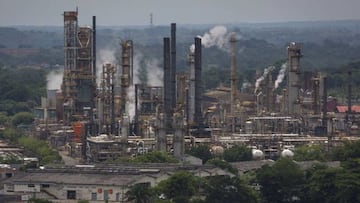What is fracking and why is it important for the election? Where do Trump and Harris stand on the issue?
The practice can extract previously untapped oil and gas reserves from deep beneath the ground but brings significant environmental concerns.

Fracking can be used to extract more oil and gas from the ground but can have catastrophic effects on the local environment and the health of residents.
Follow live the US elections 2024
A shortening of ‘hydraulic fracturing’, the practice involves water, sand and chemicals being injected into the ground at extremely high pressures, allowing miners to release oil and gas trapped beneath rock.
Fracking has been in use since 1949 but became much more common in the mid-2000s when companies began combined it with more traditional methods like horizontal drilling.
Like many lucrative practices, fracking comes with environmental worries. One of the most serious issues is the potential contamination of drinking water sources. A Greenpeace study in Pennsylvania found systematic evidence of methane contamination in household drinking water near drilling operations.
In Lancashire, Great Britain, numerous tremors were recorded near a fracking site, including some of the largest earthquakes in the country’s history.
There is no federal ban on fracking and the practice is allowed by most local authorities.
Where do Trump and Harris stand on the issue?
Fracking is particularly important in swing states like Pennsylvania, Ohio, Colorado, and New Mexico. These states have strong support for fracking due to the thousands of residents employed in the fossil fuel industry. Pennsylvania, the second-largest gas producer in the US and a state Harris leads by a single point, carries 19 electoral votes. These can’t be discounted come November.
Throughout his presidency and beyond, Trump has been a staunch advocate for fracking, viewing it as essential for energy independence and economic growth. He has consistently promoted the expansion of fossil fuel production, arguing that fracking creates jobs and lowers energy prices. Trump’s administration rolled back numerous environmental regulations to support the oil and gas industry.
Kamala Harris had expressed concerns about the environmental impacts of fracking, saying back in 2019 she would ban the practice. However, she has more recently reversed that opinion and would not ban it now.
